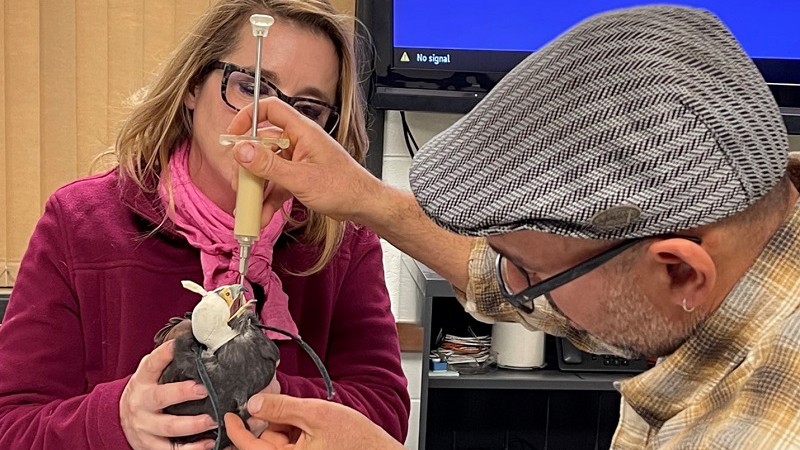Rocky Mountain Power employees learn to care for injured raptors

CASPER, Wyo. — Rocky Mountain Power employees are learning how to administer emergency first aid to injured birds of prey. The training, hosted by the PacifiCorp Renewables group in Casper, Wyoming, focused on raptor handling and first aid for injured birds of prey.
The proactive, voluntary new program helps operations and environmental personnel be better prepared in case they come across an injured raptor during their work duties and demonstrates PacifiCorp’s commitment to environmental stewardship.
“This type of training is a continuation of PacifiCorp’s ongoing commitment to Wyoming’s valued environmental and wildlife resources,” said Sharon Fain, Rocky Mountain Power vice president for Wyoming. “Our recent recognition by the Wyoming Game and Fish Department confirmed that company initiatives like this are important not only to the state, but for preservation of the wildlife we strive to protect every day.”
Last month, the Wyoming Game and Fish Department announced Rocky Mountain Power as its 2021 recipient of the Industry Wildlife Stewardship Award. The award honors companies whose primary mission is not wildlife-related and makes a positive impact through development/improvement for the benefit of fish, wildlife or habitat.
“PacifiCorp works diligently to avoid and minimize impacts of our operations on avian species through careful project siting, disturbance-free buffers, seasonal disturbance setbacks, and meaningful communication and coordination with state and federal wildlife agencies,” said Travis Brown, director of wind compliance and permitting. “Occasionally our employees respond to sick or injured birds near our infrastructure as authorized by our various wildlife permits. Providing this voluntary and proactive raptor training ensures we have the proper tools and skills to better assist in injury recovery and further builds on our reputation as leaders addressing wildlife stewardship challenges.”
The raptor training focused on ways to safely capture and properly handle avian species as small as sparrows and as large as golden eagles. Employees were instructed on different methods for securely transporting various species along with lessons on how to provide emergency hydration and nourishment for injured raptors using a feeding tube. Employees also learned how to install a backpack transmitter onto a raptor. The small, lightweight transmitters are used in avian tracking studies to monitor seasonal wildlife movements.
Discussions also included how federal and state permits allow employees to legally help migratory birds and eagles they may come across in the field during their regular work duties.
Without the proper permits, people are not legally allowed to capture or possess migratory birds or eagles. At PacifiCorp, most of our environmental teams have obtained the required federal and state permits needed to conduct these types of interactions with various wildlife species.